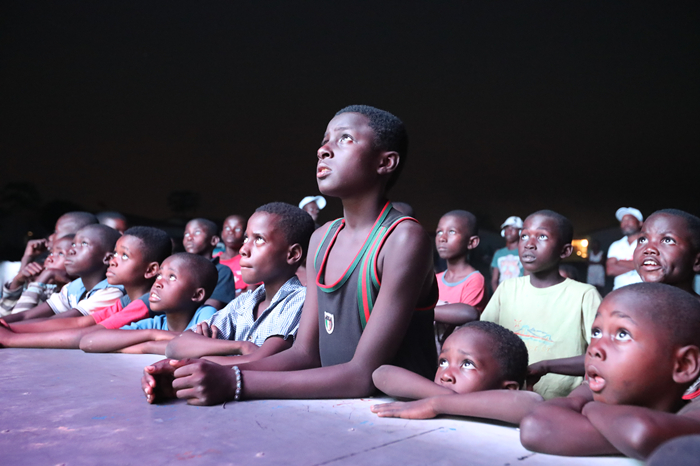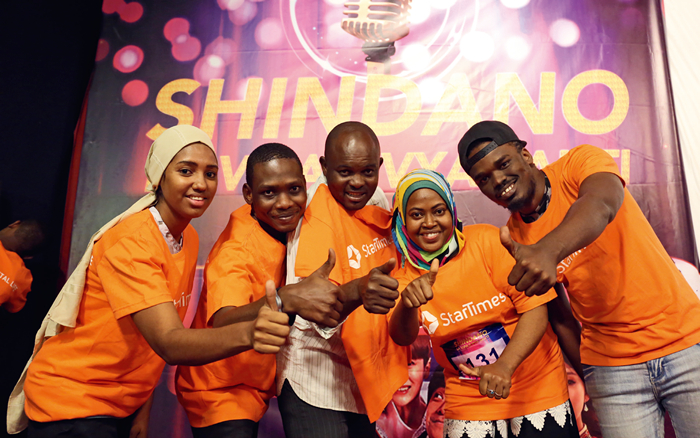|
||||||||||
| Home Nation World Business Opinion Lifestyle ChinAfrica Multimedia Columnists Documents Special Reports |
|
||||||||||
| Home Nation World Business Opinion Lifestyle ChinAfrica Multimedia Columnists Documents Special Reports |
| ChinAfrica |
| Shining Star |
| Chinese media company StarTimes makes affordable, quality satellite TV available in Africa |
| By Hu Fan 丨VOL. 14 FEBRUARY 2022 ·2022-02-07 |

Kids watch StarTimes TV program in a village in the Republic of the Congo on June 10, 2018 (COURTESY)
On November 26, 2021, a ceremony was held in a village in central Uganda’s Wakiso District to celebrate the completion of the second phase of the project of the Access to Satellite TV for 10,000 African Villages in Uganda. First launched in July 2018, the project in Uganda has provided satellite TV services in over 900 villages, benefiting around 1 million people in the country.
It’s an outcome of the 2015 Johannesburg Summit of the Forum on China-Africa Cooperation held in South Africa, where the Chinese Government pledged to provide satellite TV in 10,000 African villages.
The project is carried out by StarTimes, a private Chinese media group based in Beijing. Setting its foot in Africa in 2007, the company is now one of the major digital TV services providers in the continent.
“It has been our mission in Africa to provide affordable and quality digital TV services to the African people,” Chen Qingzhong, StarTimes’ Public Affairs Director, told ChinAfrica.
According to him, the company now operates in over 30 African countries such as Rwanda, Nigeria, Kenya and Tanzania, and has over 13 million digital TV users in the continent.

Cast of Chinese TV drama The Young Doctor meet their fans in Tanzania on September 22, 2015 (COURTESY)
Affordable access
StarTimes developed an interest in Africa in 2002. At the time, the company was already a major player in China’s media industry and was seeking overseas expansion. While the digital TV markets in Asia, Europe and the Americas had already saturated, there was much room for growth in the African market. In the Sub-Saharan African countries, only one South African company and a few European companies were offering digital TV services, and at high costs - $200 for installation of the devices and a monthly charge of $40 to $100 – which made digital TV a privilege of the wealthy.
“We realized that if we could provide services that are affordable, we would definitely succeed in this huge market with a population of nearly 1 billion at that time,” Chen said.
In 2007, the company established its first African branch in Rwanda and embarked on a massive expansion in the continent. After obtaining nearly 100 broadcasting licenses in different countries, the company put its focus on expanding its user base. They charged $5 for the initial installation of devices and $3 monthly fee for their package of services, which contained at least 30 channels. The affordable prices helped them quickly expand their user base.
After that, providing affordable access to digital TV in Africa became part of StarTimes’ mission. To fulfill that, the company has also catered to the TV needs of the marginalized groups.
The Access to Satellite TV for 10,000 African Villages project carried out by the company involves a total of 10,112 villages in 23 African countries. As of the beginning of December 2021, nearly 10 million people in 9,012 villages have benefited from the project.
The Carnival of Chinese Films and TV Dramas is another program the company implements to expand access to its content in rural areas of Africa. Company staff drive to villages and play films and other programs in make-shift cinemas. First launched in 2017, the activity has been carried out in more than 60 villages in nine countries including Zambia, the Republic of the Congo, Senegal and Nigeria. Forty-four films dubbed by the company in local languages were screened, benefiting more than 70,000 African people.

Winners of a StarTimes dubbing competition held in Zanzibar Island, Tanzania, on September 4, 2016 (COURTESY)
Tailored services
The low prices have not come at the cost of quality, though. On the contrary, the company has been upgrading its infrastructure and content to improve its services. With relay stations, satellite and terrestrial transmission as well as Internet video services, the company’s programs are accessible in all of Africa, and it is also helping African countries digitalize their broadcasting industries, i.e., replacing analog signal transmission with more advanced digital signal transmission.
In 2021, StarTimes completed the digital transformation of Mozambique’s broadcasting industry, including construction of a nationwide digital transmission network, digital transformation of the national TV station, construction of digital TV terminals, and training of Mozambican technicians. Commenting on the project, Mozambican President Filipe Nyusi said that the digital transformation is a big step forward for Mozambique’s TV technology and has enabled the delivery of diversified digital TV programs to the Mozambican people.
To provide its African audience with more options, StarTimes has integrated over 600 channels into its platforms, including popular African channels, mainstream Chinese channels, well-known international channels and the company’s own channels. The content covers news, variety shows, films, TV dramas, sports, music, fashion, etc., which are broadcast in more than 10 languages including Chinese, English, French, Portuguese, and local languages such as Swahili, Hausa and Yoruba. It also provides online streaming content at its mobile client StarTimes ON, which has developed a user base of 27 million people.
The company operates 43 channels of its own, featuring kungfu, Chinese film and TV dramas, and programs in Swahili. Its popular self-made programs include reality TV dating show Hello Mr. Right, Swahili talk show Mezani Leo, and makeup show S-Belle.
Great importance is also attached to local human resources development, especially those with language skills. “We have concluded from years of operations in Africa that for a program, using the right language is even more important than the content of the program itself,” Chen said.
The Chinese Film and Television Dubbing Competition is an important way for the company to select talents in African countries. Since 2016, 23 events have been held in Tanzania, Nigeria, Côte d’Ivoire, South Africa and Mozambique, involving languages including Swahili, Hausa, Portuguese and Zulu. By holding the competition, StarTimes not only selected outstanding local dubbing actors, but also helped nurture local talents.
Enhancing cultural exchange
Thanks to its pool of dubbing talents mastering different languages, StarTimes is able to introduce Chinese films, TV drama, cartoons and other contents to different corners of Africa, which has helped African people better understand China.
Initially, however, the Chinese content was brought to Africa to serve the needs of the Chinese working or living in the continent. Then the company found Africans also liked to watch these programs, even though they didn’t understand the language.
“Their interest grew as China-Africa cooperation strengthened. They hoped to understand through films and television dramas the current situation of China and how it has developed,” Chen said.
In 2011, StarTimes established its translation and dubbing center in a bid to build the world’s best multilingual channel for Chinese films and TV dramas. Starting with providing English and French subtitles, the company now produces dubbed films and TV drams in various languages, including local languages. Up to now, it has translated more than 40,000 episodes or dramas, and produced more than 35,000 dubbed episodes.
According to the company, of all the content, action movies and dramas remain the favorite of African people, largely due to their love for the earlier generations of Chinese kungfu stars. TV dramas that show contemporary life in China are also popular. They bring fresh experience and resonate with the African audience with the values they reflect, such as care for children, respect for the elderly and loyalty to friends. For the kids, popular Chinese cartoons are provided in the company’s channel for children.
Currently, the company is deepening its role in China-Africa cultural cooperation by involving more Africans in its operations. Apart from more reality shows made in Africa, it plans to involve Africans in all aspects of production such as planning, directing, shooting and acting.
“In the context of growing China-Africa friendship, StarTimes will continue to play an active role in promoting cultural exchanges,” Chen said.
Comments to hufan@chinafrica.cn
|
||||||||||||
| About Us | Contact Us | Advertise with Us | Subscribe |
| Copyright Beijing Review All rights reserved 京ICP备08005356号-5 京公网安备110102005860号 |